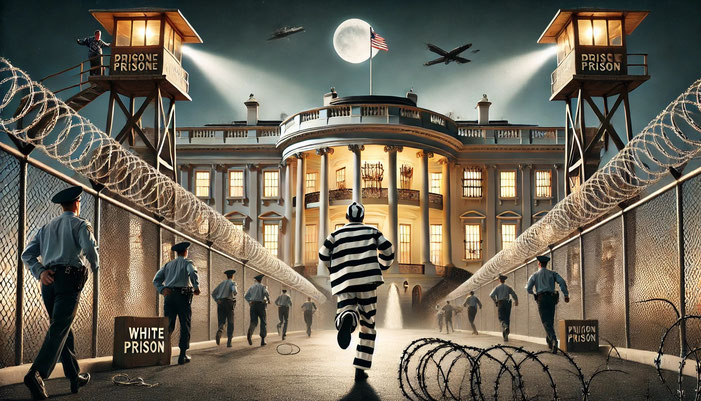
Pardon Me? The Presidential Get-Out-of-Jail-Free Card
The controversy of America's ultimate executive privilege
4-5 minute read

In the grand theatre of American politics, the presidential pardon stands as a deus ex machina—a divine intervention that can absolve sins with the flourish of a pen. Enshrined in Article II, Section 2 of the U.S. Constitution, this power allows the president to grant reprieves and pardons for federal offenses, barring cases of impeachment. Its origins trace back to the royal prerogative of mercy wielded by British monarchs, a lineage that should immediately set off alarm bells for anyone with a modicum of historical awareness.
A Brief History of Clemency
The Founding Fathers, in their infinite wisdom (or perhaps naivety), bestowed upon the president this monarchical relic, ostensibly to temper justice with mercy. Alexander Hamilton, in Federalist No. 74, argued that in times of insurrection or rebellion, a single executive should possess the authority to extend mercy, thereby restoring tranquility to the commonwealth. One might wonder if Hamilton foresaw the tranquility that accompanies pardoning political cronies and campaign donors.
George Washington set the precedent by pardoning participants of the Whiskey Rebellion in 1795, an act aimed at national reconciliation. Thomas Jefferson followed suit, granting clemency to those convicted under the Alien and Sedition Acts, viewing them as victims of draconian legislation. Abraham Lincoln, ever the unifier, used pardons to encourage Confederate deserters to lay down arms. These early uses, while arguably noble, opened the floodgates for a power that has since been wielded with less altruistic intentions.
The Descent into Controversy
Fast forward to the 20th century, and the presidential pardon had evolved—or rather devolved—into a tool for political expediency. Gerald Ford's 1974 pardon of Richard Nixon, post-Watergate, was framed as a means to heal the nation. In reality, it was a stark reminder that in the corridors of power, accountability is often a quaint notion reserved for the proletariat. Ford's approval ratings plummeted, and the public's trust in government, already on life support, took another blow.
Bill Clinton's last-minute pardons in 2001 further exemplified the perversion of this executive privilege. Among the 140 individuals pardoned was Marc Rich, a billionaire fugitive indicted on charges of tax evasion and illegal trading with Iran during a U.S. embargo. Rich's ex-wife had made substantial donations to the Clinton Library and the Democratic Party—a coincidence that strains credulity. The stench of quid pro quo was unmistakable, yet the constitutional safeguard remained unchallenged.
The Modern Misuse
The 21st century has witnessed a cavalcade of controversial pardons that underscore the inherent dangers of unchecked executive clemency. Donald Trump's tenure was marked by pardons of political allies and individuals convicted of egregious offenses. Joe Arpaio, the Arizona sheriff notorious for racial profiling and contempt of court, received a presidential pardon in 2017, signaling an endorsement of his draconian methods. Roger Stone and Paul Manafort, both ensnared in the Russia investigation, were similarly absolved, raising alarms about the erosion of judicial independence.
Not to be outdone, President Joe Biden recently pardoned his son, Hunter Biden, who faced federal charges including tax evasion and lying on a firearm application. Biden defended his decision by asserting that his son was a victim of political targeting, labeling the judicial processes against Hunter as a "miscarriage of justice." Critics, including former President Donald Trump and several politicians from both parties, have condemned the pardon as an abuse of power, undermining the principles of justice and setting a bad precedent. They argue that Hunter Biden should be held accountable for his actions, and pardoning him reflects political hypocrisy and erodes public trust in the justice system.
The Illusion of Justice
The presidential pardon is often romanticized as an instrument of mercy, a failsafe against the rigidity of the law. In practice, it has morphed into a mechanism for perpetuating systemic inequities. The power dynamics at play ensure that those with proximity to influence are more likely to receive clemency, while the disenfranchised languish under draconian sentences. The case of Leonard Peltier, a Native American activist imprisoned since 1977, serves as a poignant counterpoint. Despite widespread calls for his release, successive presidents have turned a deaf ear, underscoring the selective application of mercy.
A Call for Reformation
The unchecked nature of the presidential pardon necessitates a reevaluation of its place in a purportedly democratic society. Introducing oversight mechanisms, such as a bipartisan clemency board, could mitigate abuses of power. Additionally, constitutional amendments to limit the scope of pardons—particularly in cases involving political allies or personal interests—would serve as a safeguard against cronyism. Without such reforms, the pardon remains a relic of monarchical authority, incongruous with the principles of egalitarianism and justice. The presidential pardon, in its current incarnation, is less an act of grace and more a testament to the enduring influence of elitism within the American political system.



Write a comment